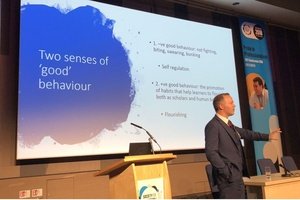As part of their degrees, teaching students are required to undertake about 600 hours of placement, while aspiring nurses have to do about 800 hours, forcing many to give up part-time jobs for unpaid labour.
But from July 2025, about 68,000 university students and 5000 vocational education and training students will be eligible for a $319.50 payment each week, in addition to income support they may already receive, as part of the Federal Government’s budget in mid-May.
Education Minister Jason Clare said the paid placements are aimed at easing workforce shortages in the care and education sectors and the Government could expand this to other industries later down the line.
“It’s intended to make sure that a lot of people who struggle to pay the bills while they’re doing (practical work) as part of their degree, finish their degree,” he told ABC radio on Monday.
The payments will also be means-tested, Clare added, to ensure they go to students who need it most.
“This will give people who have signed up to do some of the most important jobs in this country a bit of extra help to get the qualifications they need,” he said.
“This is practical support for practical training."
Clare said placement poverty is a real thing.
"I have met students who told me they can afford to go to uni, but they can’t afford to do the prac.
“Some students say prac means they have to give up their part-time job, and that they don’t have the money to pay the bills.”
While AEU Federal President Correna Haythorpe welcomed the paid practicums, she said for too long students had carried the financial burden of their practicums, often having to give up part-time work and experiencing placement poverty for weeks on end while finishing their studies.

Haythorpe says while the AEU is pleased with the dual announcement, much more needs to be done, including addressing chronic workloads, fully funded professional development and mentoring programs to support teachers as they begin their profession.
“Australia is experiencing a chronic teacher shortage and one of the key issues has been attracting new students into Initial Teacher Education,” Haythorpe said.
“With half of students not completing their teaching degree this measure will help to not only attract students but also financially support them to complete their studies to be a teacher. That will be life changing for many students.”
Haythorpe said as part of the National Teacher Workforce Action Plan discussions, the AEU raised the critical issue of attraction and retention and in particular the importance of paid internships and paid practicums.
“We are very pleased to see this announcement by the Albanese Government, as it is a first step towards building a strong teaching profession.
“However, much more needs to be done, including addressing chronic workloads, fully funded professional development and mentoring programs to support teachers as they begin their profession.”
ACTU Assistant Secretary Liam O’Brien said the high costs associated with mandatory placements have been a barrier to many students, particularly those from disadvantaged backgrounds.
“With the majority of students and workers in these vital sectors being women, this payment aligns with the Albanese Government's gender equality strategy and creates a pipeline of future workers to address skills in critical areas.
“The Commonwealth Prac Payment is a vital step towards ensuring that students have equal access to educational opportunities, regardless of their financial backgrounds.”
The announcement is part of a broader Government effort to appeal to young voters after it also revealed that it would wipe about $3 billion of student debt in the Federal Budget.
Under the measure, more than three million Australians will receive a deduction from their loans at an average cut of roughly $1200 each.
It will provide significant relief for students while continuing to protect the integrity and value of the HELP and other student loans systems, which the Government said have massively expanded tertiary access for more Australians.
“We are doing this, and going further,” Clare said in a statement.
“We will backdate this reform to last year.
“This will wipe out what happened last year and make sure it never happens again.”

In real terms that means the Government will backdate the relief to all HELP, VET Student Loan, Australian Apprenticeship Support Loan and other student support loan accounts that existed on June 1 last year.
And in response to the Australian Universities Accord, the Government will cap the HELP indexation rate to be the lower of either the Consumer Price Index (CPI) or the Wage Price Index (WPI) with effect from June 1, 2023.
This will benefit all Australians with a HELP debt, fixing the issue of last year’s spike in the CPI indexation rate of 7.1 per cent and preventing growth in debt from outpacing wages in the future.
The 2023 indexation rate based on WPI would only have been 3.2 per cent.
Shadow education minister Sarah Henderson said “Labor’s HECS debt chaos is a mess of its own making”.
“Today’s announcement is all trickery and deceit and doesn’t fix Labor's student debt trap that has hit 3 million Australians,” the Senator said on Sunday.
“Under Labor, student debts will still increase by a crippling 11.1 per cent (3.9 per cent, 3.2 per cent and 4 per cent as reported), driving up the average loan by $2800.
“A HELP-HECS indexation rate of 4 per cent this year would be the highest in 23 years.”
Deputy Liberal leader Sussan Ley, meanwhile, said she found the suggestion students who weren’t already paying back debt wouldn’t be worried about increases “really insulting”.
“They’re actually anxious when they see their student debt go up ... they still see that amount going up and it’s quite scary for them and they know that it’s looming over them,” she told Sky News on Sunday.
“I don’t think students will feel particularly warm and welcoming of this announcement.”
Universities Australia backed the move as cost-of-living pressures continue to bite.
“These changes are a significant win for Australians with a HELP debt and will make a real difference in people’s lives,” Universities Australia chief executive Luke Sheehy said.
Greens education spokeswoman Mehreen Faruqi said student debts shouldn’t be growing at all.
“Let’s be clear, this will not provide any cost-of-living relief to people who are struggling to make repayments, pay rising rents and afford their groceries,” she said.
Prime Minister Anthony Albanese said the announcements will help expand access to education and ensure no Australians are left behind.
“We’re proud to be backing the hard work and aspiration of Australians looking to better themselves by studying at university,” he said.
“We’re funding support for placements so our future nurses, teachers and social workers can gain the experience they need.”
(with AAP)
















